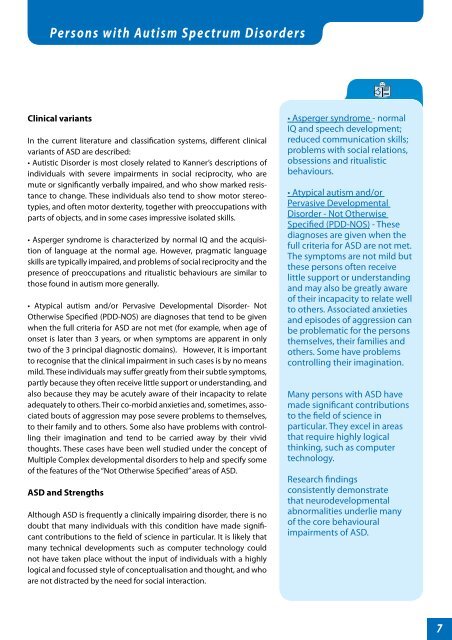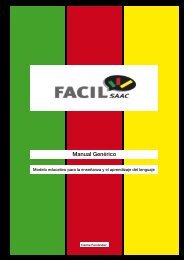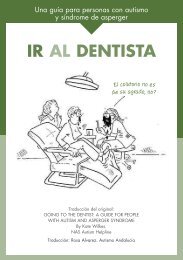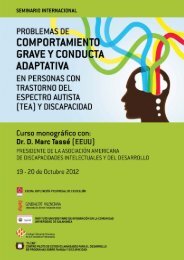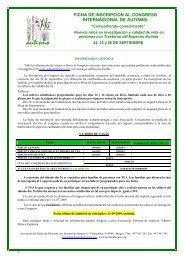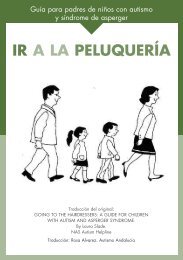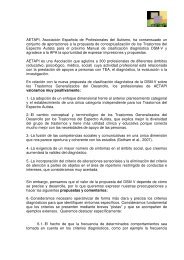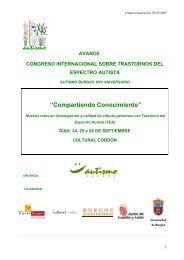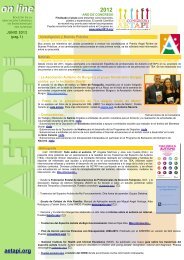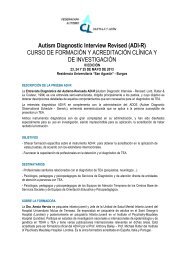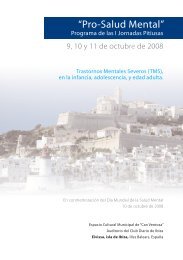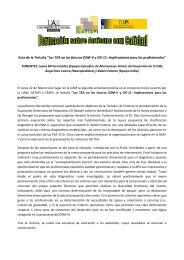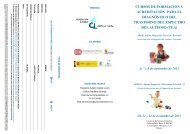persons with autism spectrum disorders - Aetapi
persons with autism spectrum disorders - Aetapi
persons with autism spectrum disorders - Aetapi
You also want an ePaper? Increase the reach of your titles
YUMPU automatically turns print PDFs into web optimized ePapers that Google loves.
Persons <strong>with</strong> Autism Spectrum Disorders<br />
Clinical variants<br />
In the current literature and classification systems, different clinical<br />
variants of ASD are described:<br />
<br />
individuals <strong>with</strong> severe impairments in social reciprocity, who are<br />
mute or significantly verbally impaired, and who show marked resistance<br />
to change. These individuals also tend to show motor stereotypies,<br />
and often motor dexterity, together <strong>with</strong> preoccupations <strong>with</strong><br />
parts of objects, and in some cases impressive isolated skills.<br />
tion<br />
of language at the normal age. However, pragmatic language<br />
skills are typically impaired, and problems of social reciprocity and the<br />
presence of preoccupations and ritualistic behaviours are similar to<br />
those found in <strong>autism</strong> more generally.<br />
<br />
Otherwise Specified (PDD-NOS) are diagnoses that tend to be given<br />
when the full criteria for ASD are not met (for example, when age of<br />
onset is later than 3 years, or when symptoms are apparent in only<br />
two of the 3 principal diagnostic domains). However, it is important<br />
to recognise that the clinical impairment in such cases is by no means<br />
mild. These individuals may suffer greatly from their subtle symptoms,<br />
partly because they often receive little support or understanding, and<br />
also because they may be acutely aware of their incapacity to relate<br />
adequately to others. Their co-morbid anxieties and, sometimes, associated<br />
bouts of aggression may pose severe problems to themselves,<br />
to their family and to others. Some also have problems <strong>with</strong> controlling<br />
their imagination and tend to be carried away by their vivid<br />
thoughts. These cases have been well studied under the concept of<br />
Multiple Complex developmental <strong>disorders</strong> to help and specify some<br />
of the features of the “Not Otherwise Specified” areas of ASD.<br />
ASD and Strengths<br />
Although ASD is frequently a clinically impairing disorder, there is no<br />
doubt that many individuals <strong>with</strong> this condition have made significant<br />
contributions to the field of science in particular. It is likely that<br />
many technical developments such as computer technology could<br />
not have taken place <strong>with</strong>out the input of individuals <strong>with</strong> a highly<br />
logical and focussed style of conceptualisation and thought, and who<br />
are not distracted by the need for social interaction.<br />
- normal<br />
IQ and speech development;<br />
reduced communication skills;<br />
problems <strong>with</strong> social relations,<br />
obsessions and ritualistic<br />
behaviours.<br />
<br />
Pervasive Developmental<br />
Disorder - Not Otherwise<br />
Specified (PDD-NOS) - These<br />
diagnoses are given when the<br />
full criteria for ASD are not met.<br />
The symptoms are not mild but<br />
these <strong>persons</strong> often receive<br />
little support or understanding<br />
and may also be greatly aware<br />
of their incapacity to relate well<br />
to others. Associated anxieties<br />
and episodes of aggression can<br />
be problematic for the <strong>persons</strong><br />
themselves, their families and<br />
others. Some have problems<br />
controlling their imagination.<br />
Many <strong>persons</strong> <strong>with</strong> ASD have<br />
made significant contributions<br />
to the field of science in<br />
particular. They excel in areas<br />
that require highly logical<br />
thinking, such as computer<br />
technology.<br />
Research findings<br />
consistently demonstrate<br />
that neurodevelopmental<br />
abnormalities underlie many<br />
of the core behavioural<br />
impairments of ASD.<br />
7


